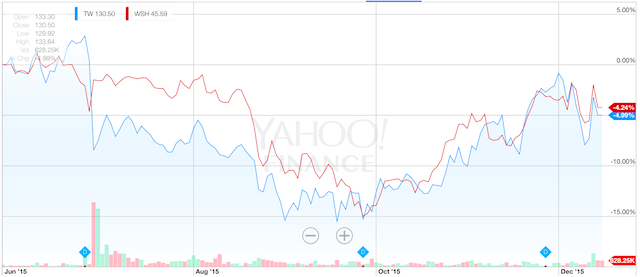Towers Watson and insurance brokerage Willis secured enough shareholder votes Friday to move ahead with their controversial $18 billion merger, but have failed to silence the critics.
Striking opposition from major shareholders (BlackRock, Driehaus Capital) and the largest proxy advisors (Institutional Shareholder Services [ISS], Glass, Lewis & Co.) had put the deal in doubt. Their opposition forced management to delay votes by three weeks and renegotiate.
“I’ve been doing this for eight years now, and I don’t recall any other deal that was such a good value-creating transaction and yet shareholders really objected to it,” ISS’ M&A Director Chris Cernich told CIO. “The industrial logic is very strong on this one, and nobody doubted that.”
“We do not believe this transaction provides sufficient value to Towers Watson shareholders—even with the improved terms. We voted against the transaction.”
For or very much against the deal, stakeholders echoed Towers and Willis’ rationale for the union: The potential to “create substantial incremental shareholder value through revenue, cash flow, and EBITDA [earnings before interest, taxes, depreciation, and amortization] growth superior to what either company could achieve independently,” as the two firms said in the approval announcement.
But ISS, along with many prominent Towers investors, took issue with the original and revised terms’ fairness. The initial $4.87 per share dividend effectively discounted Towers shares by 9.3%, according to ISS’ analysis. “As a merger-of-equals, shareholders didn’t expect to receive a premium,” Cernich explained. “But there was no precedent for why a 9% discount was appropriate.” Accepting that haircut to “get the deal done,” he continued, means Towers would have to grow in value by 18.6% to break even. “That’s a big hole to climb out of.”
But even among peer proxy firms, the merger proved divisive. New York City-based Proxy Mosaic recommended shareholders approve the original terms, deeming the focus on Towers’ share dividend “very short-termist.” Director of Research David Whissel argued that the “quite vocal” dissident shareholders and proxy firm competitors “seemed to be missing what a merger-of-equals is all about: A low-premium or no premium deal, with pretty significant cost synergies. The idea is that you capture the upside, which takes the place of the premium.”
Still, following high-profile proxy and investor pushback, management sweetened terms for Towers investors at the eleventh hour, foremost by doubling the much-maligned dividend to $10. This allowed the merger-of-equals to move ahead with 62% outstanding shareholder support, according to a regulatory filing submitted Friday. Most mergers earn well over 80% approval.
Willis and Towers co-announced the successful vote, predicting the transaction would close “very early in the New Year.” Pending regulatory approval, Willis shares will undergo a reverse stock split, with each Towers share converted into one share of Willis Towers Watson.
But for the merger’s most visible critics, the $10 dividend offer was too little, too late.
Driehaus Capital, which owns a 1.5% stake in Towers, reiterated its opposition within hours of the approval announcement.
“We do not believe that this transaction provides sufficient value to Towers Watson shareholders—even with the improved terms offered on November 19. Accordingly, we voted against the transaction this morning,” wrote two Driehaus portfolio managers in an open letter. Towers Watson represented the $9.5 billion asset management firm’s largest position by far as of September 30—a position it intends to retain in post-merger Willis Towers Watson.
“We expect them to deliver the extraordinary value promised in their ardent defense of the Willis transaction,” the letter concluded.
Towers Watson & Willis Share Prices Since Merger Proposal: June 1 – Dec. 15, 2015
 Towers Watson (TW): Blue / Willis Group (WSH): Red
Towers Watson (TW): Blue / Willis Group (WSH): Red
Related: Strife Erupts on Proposed Towers Watson Merger & Towers Watson to Merge with Willis Group
